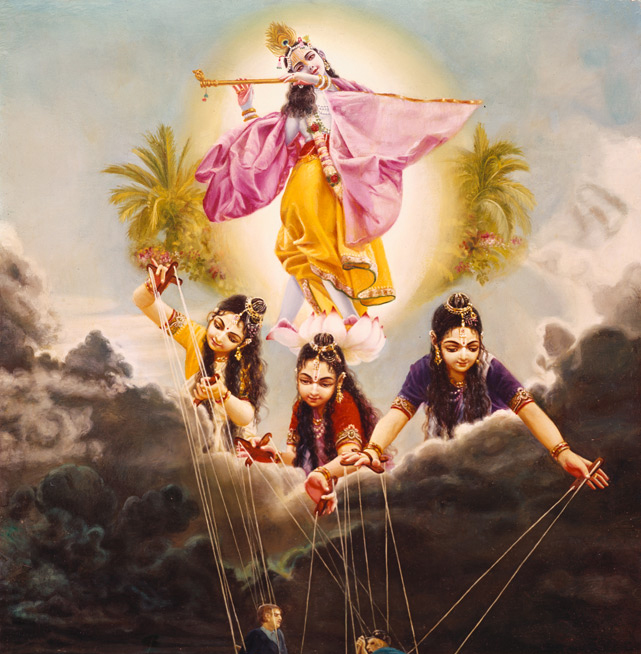Question: I have read in many places about the phrase ‘fall down’. I am a bit confused about what is the meaning of fall down of a devotee?
What does it actually mean when we say a devotee (both a neophyte and a elevated devotee) has fallen down? When can I consider that I have fallen down? Is it that when we deviate from the instructions of the spiritual master in a broader sense, or is it when we break any regulative principle; or is it both, or is it anything else? A Pure devotee cannot fall down (by Krishna’s Grace). For aspiring devotees like us, since we are not pure, we are anyways fallen. So how can we identify that event of fall down and take a recourse action to reinstate ourselves?
Answer by Romapada Swami:
‘Fall-down’ fundamentally has to do with the condition of the heart, not just external conduct. As soon as the fallible living entity chooses to enjoy rather than serve Krishna (krishna bhuliya jiva bhoga vancha kare), immediately they are captured by maya and ‘fall down’.
The conditioned soul is almost always steeped in thoughts of sense-gratification and forgetful of Krishna. In that sense, as you say, they are already fallen. But one who has sincerely surrendered to a bona fide spiritual master and is strictly following his instructions — at whatever position one is situated in — is considered pure in that level of devotional service.
Krishna describes in SB 11.21.2, “Steadiness in one’s own position is declared to be actual piety, whereas deviation from one’s position is considered impiety.” Srila Prabhupada has prescribed for all his followers a basic program of devotional service viz. chanting minimum 16 rounds, following the 4 regulative principles, taking only prasadam, hearing from and serving the spiritual master and associating with devotees — falling away from these minimal standards and practices is a fall-down from devotional service.
Furthermore, the spiritual master gives specific instructions according to one’s nature and level of spiritual realization, and more broadly Srila Rupa Goswami has recommended the standard principles for a devotee (as found in Nectar of Instruction and Nectar of Devotion) — one must carefully follow these prescriptions and prohibitions. As one advances one must honestly take steady steps forward, commensurate with one’s realizations and responsibilities, without being attached to the lower sets of rules. Deviating from one’s position or falling below one’s prescribed standard at any level would be considered a fall-down from that position.
As in driving a car, one must be constantly vigilant to stay on the road — the moment one becomes inattentive, one is poised to go off the edge. In the beginning, i.e. when one is in the unsteady stages of devotional service, there is a constant struggle with the mind and senses. But a sincere devotee conscientiously and repeatedly strives to submit to Guru and Krishna, regularly examines the hearts and address residual material desires, genuinely regrets mistakes and deviations, seeks forgiveness from a competent authority and reinstates oneself — these are part of the regular sadhana of a properly situated devotee. By such practice, one quickly becomes steady in devotion — ksipram bhavati dharmatma. According to Krishna, such an ananya-bhak devotee is to be considered a saint; their occasional, circumstantial or unintentional fall-down is not taken into consideration. (BG 9.30-31)
However, if a devotee repeatedly neglects the regulative principles of bhakti, either deliberately or carelessly, and makes a habit of justifying deviations, it is but a matter of time that they will fall down, even if they may seemingly follow the external activities and regulations of devotional service. Particularly, when someone commits serious offenses, minimizes the spiritual master / disciplic succession, or engages in gross transgression of religious principles, we identify such a devotee as “fallen”, for the purpose of exercising caution in associating with them as it is harmful to our bhakti.
Although here we define a fall-down in terms of ‘acara’ or conduct, the actual deviation originates in the heart. The seed, or warning signal, of a fall-down-waiting-to-happen can be identified in a *slackening of submission * towards the spiritual master. When this is unattended to for prolonged periods, it grows and nourishes dormant material desires, doubts, uncontrolled senses etc; gradually these manifest in the form of weakening of faith, negligence in devotional practices and/or offenses. Ultimately it leads to more serious deviations or transgressions from instructions / religious principles.
Therefore, rather than waiting for the event of a serious fall-down to rectify oneself, devotees should routinely monitor and take steps to protect and strengthen themselves against the influence of maya. The key is to regularly, daily, submit to the *process of hearing* and making oneself *accountable to devotees*. When we try to submissively hear from saintly persons (and studying scriptures), areas of weak faith and submission are quickly revealed. Another important safeguard is accountability — to superior vaishnavas as well as to one’s peers. Having confidential loving relationships with devotees, where one feels comfortable to honestly reveal one’s actual position and struggles is an immense protection against potential fall-downs. There may be many causes for fall-down — most prominent of these are listed in NOI 3, such as prayasa for material gain, bad association etc — but all these are quickly rectified when there in strong hearing and association.
Almost always, it is seen that the fall down of a devotee begins with a slackening of hearing and chanting, and/or lack of confidential vaishnava relationships. Whether one is in the beginning stages or is very practiced and accomplished devotee — no one, at any stage of Krishna consciousness, can afford to neglect these two fundamental principles. Bhagavatam gives the example of none less than Bharata Maharaja to illustrate this — although in the exalted bhava stage of devotion, Bharata fell trap to attachment to a deer, because of his neglect of spiritual regulations and being all alone. (SB 5.8.8) We can identify that we (or others) are properly situated in Krishna consciousness by monitoring how strong we are in these two principles.







